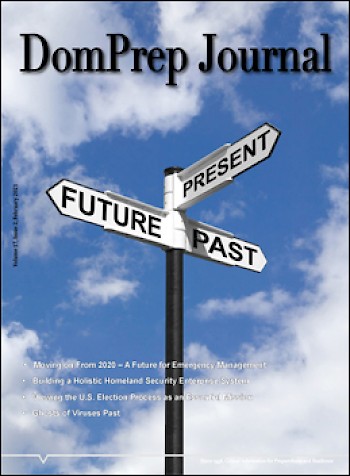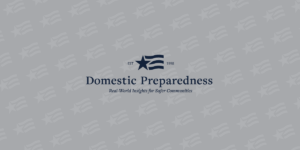

Ghosts of Viruses Past
Catherine L. Feinman
February 24, 2021
A decade before COVID-19 emerged as a pandemic, emergency preparedness, response, and resilience
professionals were focused on infectious diseases. The H1N1 (swine flu), H5N1 (avian flu), and SARS
(Severe Acute Respiratory Syndrome) outbreaks were real, and lessons needed to be learned in preparation
for something bigger. So, in April 2010, DomPrep polled the experts (i.e., DomPrep advisors and readers)
to gather their thoughts on pandemic preparedness and response. A decade later, their responses are
haunting.

Publisher’s Message: Costs vs. Benefits
Martin D. Masiuk
February 24, 2021
Over the past 20 plus years, I have been perplexed and bewildered why leaders both in government
and industry have not taken preparedness seriously. A while ago, it was explained to me. It all comes
down to cost-benefit analysis. Leaders love to present bright, shiny new things to their constituents,
shareholders, customers, media, and so on. Let’s face it, preparedness is boring! For example,
weatherizing power plants in warm environments is not economical nor exciting. Or is it? By kicking the
can, leaders hope that unpleasant, yet predictable once-in-a-hundred-years events do not happen on their
watch. Cost-benefit analysis matters a lot when those unforeseen events happen. And these types of
events have been occurring more and more frequently lately with great cost through loss of life,
sociological-psychological impact, and loss of revenue.

Building a Holistic Homeland Security Enterprise System
Daniel Rector
February 17, 2021
In the United States, a diverse group of agencies and organizations work together to accomplish the homeland security mission. Many of these organizations fall within the Department of Homeland Security (DHS). Organizations that are not directly a part of DHS act as partners and provide support in various ways. One of the most vital and most capable partners in the homeland security mission is the Department of Defense (DOD). The current organizational makeup of DHS is disorganized and confusing. As is, it prevents efficient support from its partners. The government should create a new, robust homeland security enterprise to solve these issues. By creating an updated homeland security enterprise and leaning on the DOD’s support, the nation will increase its security and protect its citizens.

Viewing the U.S. Election Process as an Essential Mission
Michael Prasad
February 10, 2021
As a critical element of democracy, elections need to be a part of the all-hazards planning, organization, equipment, training, and exercising benefiting from the nation’s emergency management agencies and departments at all levels of government. Election security, capability, and integrity, as well as the ability for citizens to exercise their constitutional rights through democratic processes are essential to the sustained republic.

Moving on From 2020 – A Future for Emergency Management
Kyle R. Overly
February 3, 2021
The events that unfolded over the course of 2020 and 2021 challenged emergency managers in ways only previously imagined. In the midst of a global pandemic, emergency managers worked through the complexities of a global response while delivering core administrative functions and coordinating the response to countless other threats and hazards. This response tested emergency management capabilities and challenged long-held assumptions about mutual aid systems.

